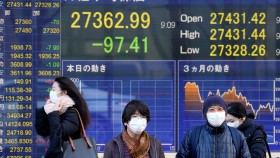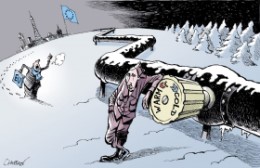Russian sanctions following the Ukraine event pushed Asian stocks higher.
U.S. Vice President Joe Biden has instituted measures to hamper Russia's ability to trade major currencies around the world.
S&P 500 futures fell 0.4%, while other Wall Street index futures also fell.
The price of a barrel of Brent was steady at just over $100 (£75).
According to British wealth management firm Schroders
Sanctions against Russia by the United States and its Western allies have been "pretty limited", but further penalties are in the works.
"It doesn't look like the fear of sanctions has deterred Russian aggression," said Tom Wilson, head of the firm's emerging markets equities practice.
"However, an invasion could lead to a stronger and more sustained response from the West," he said.

Asian shares rose on Friday, with Tokyo's Nikkei 225 closing up about 2 percent.
The Shanghai Composite rose 0.6%, while the South Korean KOSPI rose 1.1%.
According to multiple analysts
Sanctions imposed by the United States, Europe and some other countries were less severe than investors had expected.
On Thursday, Russian President Vladimir Putin announced a "special military operation" in Ukraine's Donbas region.
Vice President Biden's announcement
U.S. stock indexes rose. UK stocks suffered their biggest one-day drop since June 2020, when the FTSE 100 fell 3.9%. On Friday, it is expected to open 1.3% higher.
Still, European markets appear to be bracing for a mixed session.
Shares in U.S. stocks rose despite record oil prices.
Why is the situation in Ukraine causing global prices to rise?
Brent crude fell slightly after rising to its highest level in more than seven years on Thursday, but remained well above $100 a barrel.
According to reviewers

Russia's ability to export oil and gas without sanctions has boosted Russia's resistance to Western sanctions.
Russia is the second largest crude oil exporter after Saudi Arabia. It is also the world's largest exporter of natural gas.
Russian pipelines pass through Ukrainian territory, transporting about one-third of Europe's oil and about one-third of Europe's natural gas.
However, concerns remain that sanctions could limit global supply and increase costs.
Mansoor Mohi-uddin, chief economist at Bank of Singapore, claimed that the United States has yet to take steps to disrupt Russia's energy supply.
However, global dependence on Russian energy is not evenly distributed across the globe.
Here's what Deutsche Bank experts say
China imports 14% of oil and gas from Russia, compared to 2% for Thailand and India.
In her words, the conflict in Ukraine and rising energy costs will have an impact on the European economy.
It is rightly thought that if oil prices rose by 50%, both the euro area and the US would fall into recession. It will have a major impact on all Asian countries, no matter where they are located.